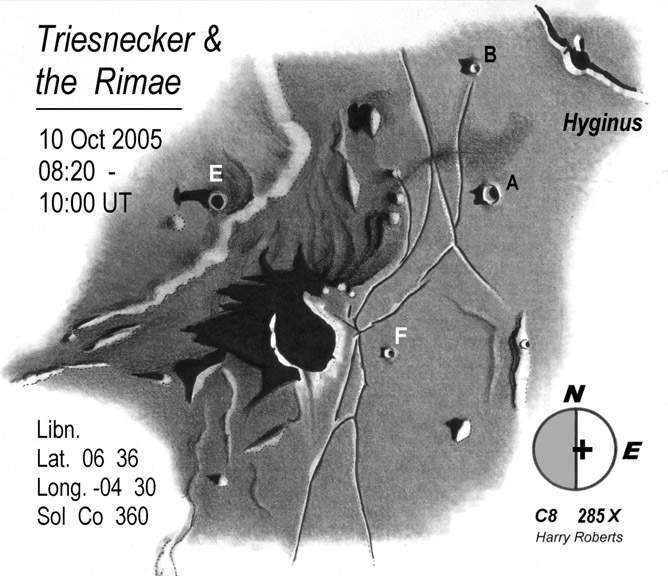
drawing by Harry Roberts
It’s a hobby – none of us gets paid (or in my case, not very much) for looking at the Moon. And as a hobby, different people take great pleasure in different kinds of involvement. I get a sweet sense of familiar joy just from unexpectedly noticing the Moon in the daytime sky. Others love roaming the terminator, with a high power eyepiece ready. A few are extraordinarily good at imaging the finest details, and another handful derive pleasure from using pencils to capture the essence of the observing experience. All of these responses are personal and usually satisfying. What more could you want from an avocation? Harry Roberts in England must greatly enjoy the Moon for he labors at the telescope and even more afterwards to make a finished drawing of a feature minutely studied. (This is a variant of the video-imager who may spend hours computer processing instantaneously acquired images.) This drawing resulted from 100 minutes of observing. Read the Technical Details for … the technical details!
Technical Details:
10 October 2005. C8 at 285X. Harry writes: In ‘01 a friend lent me a copy of Hill’s “Portfolio of Lunar Drawings” and I was hooked! Hill is a bit coy about exactly how he makes such accurate sketches; I suspect he had a full field etched grating. I couldn’t find one, so I use an old guiding e.p. with very fine etched cross hairs. With this aligned with lunar direction of drift (drive off) I can make stopwatch timings to features in the field of view, giving a series of fixed points over which I can make a fairly accurate drawing of the field. It usually takes about an hour or two to complete an outline drawing. On this I add numbers indicting brightness levels; much like Hill suggests. The whole process is immensely satisfying. I then trace the eyepiece drawing and render the scene with dilute washes of Indian ink, or blended graphite. The Triesnecker drawing is blended graphite. Hill deplores the graphite method in his intro, but I’ve found it effective. The ink wash technique is superior, but so time consuming.
Related Links:
Rükl chart 33
COMMENTS?
Click on this icon File:PostIcon.jpg at the upper right to post a comment.



